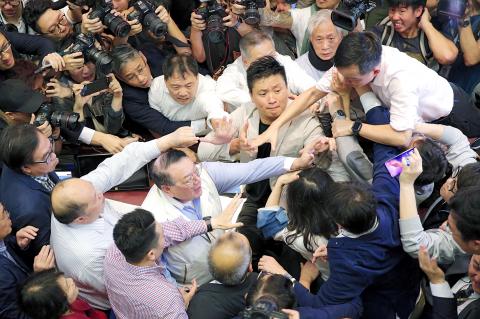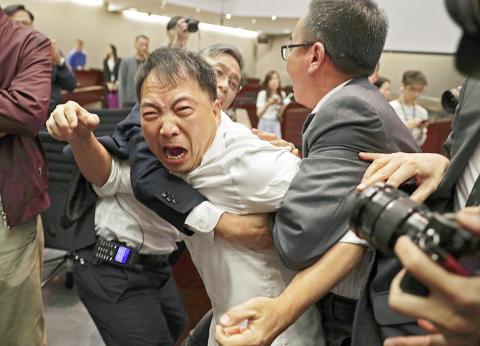Hong Kong’s legislative assembly descended into chaos yesterday as lawmakers for and against amendments to the territory’s extradition law clashed over access to the chamber.
At least one lawmaker was taken from the chamber on a gurney after apparently fainting during the morning melee, in which legislators pushed and shoved each other on the floor, amid seats and tables and in an adjoining hallway.
The amendments have been widely criticized as eroding the semi-autonomous Chinese territory’s judicial independence by making it easier to send criminal suspects to mainland China, where they could face vague national security charges and unfair trials.

Photo: AP
Under the “one country, two systems” framework, Hong Kong was guaranteed the right to retain its own social, legal and political systems for 50 years following its handover from British to Chinese rule in 1997.
However, the Chinese Communist Party has been seen as increasingly reneging on that agreement by forcing through unpopular legal changes.
Legislators in the pro-Beijing camp attempted to seat Abraham Razack (石禮謙), also known as Abraham Shek, who had been named earlier in the week through another committee and a contested interpretation of council rules to replace pro-democrat James To (涂謹申) as head of the Bills Committee.

Photo: AP
To had stalled passage of the legislation over two sessions and Razack was seen as the best chance to push it through before the July recess.
However, pro-democracy legislators continued to claim that To was the legitimate chief of the committee guiding discussion of the proposed new law.
They and their opponents had scheduled rival meetings on the same topic in the same Legislative Council meeting room yesterday, starting just 30 minutes apart.
The rival committees both claimed to be in charge of the same process of scrutinizing the new law before deciding on whether to vote on it.
At one point, Wu Chi-wai (胡志偉), the Democratic Party chairman who tried to stop Shek from presiding over the meeting, shouted at him, saying: “Don’t be a sinner for a thousand years! Don’t sell out Hong Kong.”
The legislator removed by paramedics was identified as Gary Fan Kwok-wai (範國威) of the Neo Democrats.
The amendments expand the scope for the transfer of criminal suspects to China and remove the legislature’s right to scrutinize individual extradition decisions filed by Hong Kong’s chief executive.
They could also open the way for further measures to erode Hong Kong’s civil liberties, including the passage of anti-subversion legislation that has been strongly opposed by many.
Yesterday’s legislative scuffle came weeks after a Hong Kong court handed down prison sentences of up to 16 months to eight leaders of massive 2014 pro-democracy protests on public nuisance charges.

A Ministry of Foreign Affairs official yesterday said that a delegation that visited China for an APEC meeting did not receive any kind of treatment that downgraded Taiwan’s sovereignty. Department of International Organizations Director-General Jonathan Sun (孫儉元) said that he and a group of ministry officials visited Shenzhen, China, to attend the APEC Informal Senior Officials’ Meeting last month. The trip went “smoothly and safely” for all Taiwanese delegates, as the Chinese side arranged the trip in accordance with long-standing practices, Sun said at the ministry’s weekly briefing. The Taiwanese group did not encounter any political suppression, he said. Sun made the remarks when

The Taiwanese passport ranked 33rd in a global listing of passports by convenience this month, rising three places from last month’s ranking, but matching its position in January last year. The Henley Passport Index, an international ranking of passports by the number of designations its holder can travel to without a visa, showed that the Taiwan passport enables holders to travel to 139 countries and territories without a visa. Singapore’s passport was ranked the most powerful with visa-free access to 192 destinations out of 227, according to the index published on Tuesday by UK-based migration investment consultancy firm Henley and Partners. Japan’s and

BROAD AGREEMENT: The two are nearing a trade deal to reduce Taiwan’s tariff to 15% and a commitment for TSMC to build five more fabs, a ‘New York Times’ report said Taiwan and the US have reached a broad consensus on a trade deal, the Executive Yuan’s Office of Trade Negotiations said yesterday, after a report said that Washington is set to reduce Taiwan’s tariff rate to 15 percent. The New York Times on Monday reported that the two nations are nearing a trade deal to reduce Taiwan’s tariff rate to 15 percent and commit Taiwan Semiconductor Manufacturing Co (TSMC, 台積電) to building at least five more facilities in the US. “The agreement, which has been under negotiation for months, is being legally scrubbed and could be announced this month,” the paper said,

MIXED SOURCING: While Taiwan is expanding domestic production, it also sources munitions overseas, as some, like M855 rounds, are cheaper than locally made ones Taiwan and the US plan to jointly produce 155mm artillery shells, as the munition is in high demand due to the Ukraine-Russia war and should be useful in Taiwan’s self-defense, Armaments Bureau Director-General Lieutenant General Lin Wen-hsiang (林文祥) told lawmakers in Taipei yesterday. Lin was responding to questions about Taiwan’s partnership with allies in producing munitions at a meeting of the legislature’s Foreign Affairs and National Defense Committee. Given the intense demand for 155mm artillery shells in Ukraine’s defense against the Russian invasion, and in light of Taiwan’s own defensive needs, Taipei and Washington plan to jointly produce 155mm shells, said Lin,